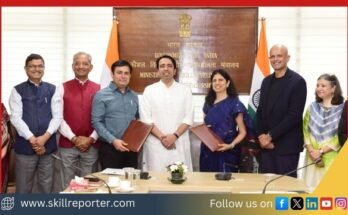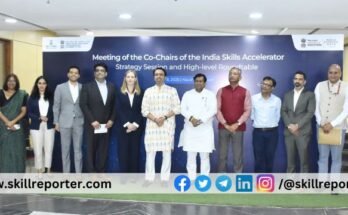The Government of India has received financing from the International Bank for Reconstruction and Development (IBRD) in the form of a loan toward the cost of Skill India Mission Operation. The Ministry of Skill Development and Entrepreneurship, Government of India, an implementing agency of the Client, intends to apply a portion of the proceeds of this loan to eligible payments under the contract for which this Request for Proposals is issued.
The Ministry of Skill Development and Entrepreneurship now invites online proposals to provide the following consulting services:
Hiring of consulting services for conducting “Review of the National Policy on Skill Development and Entrepreneurship 2015” under SANKALP (Skill Acquisition and Knowledge Awareness for Livelihood Promotion) Programme of Ministry of Skill Development & Entrepreneurship.
A firm will be selected under Quality and Cost Basis Selection (QCBS) procedures and in a Full Technical Proposal (FTP) format as described in this RFP, in accordance with the Bank’s “Procurement Regulations for IPF Borrowers” July 2016, revised November 2020, which can be found at the following website: www.worldbank.org
Objective:
To draft a revised policy document that provides a roadmap for taking the skill ecosystem in alignment with the priorities highlighted below including an action plan that may be implemented by the Government.
- Integration of vocational education with general education (School Boards/ Schools/ K12 Institutions) as envisaged in the National Education Policy (NEP) 2020 and operationalization of the National Curriculum Framework (NCF) and National Credit Framework (NCrF).
- Convergence & collaboration of skilling efforts by Central and State Governments.
- Inter- linkages between SD&E policy and various government schemes and programs such as Gati Shakti, One District One Product (ODOP), Production Linked Incentive (PLI), Digital India etc.
- Regulatory framework for skill ecosystem for institutionalizing a mechanism to align job roles and occupations with International Occupational Standards for promoting international workforce mobility.
- Sustainability quotient of skills for development of job roles for the green jobs sector.
- Decentralization in skill development for last mile delivery of skilling initiatives.
- Digital enablement of skilling and focusing on Future of Work in the context of emerging technologies and emerging paradigms such as sustainability, innovative business models, energy, mobility, among many others.
- Strengthen industry connect by reviewing existing SSC framework and initiatives including Dual System of Training (DST), Flexi-MoU and provisions for On-the-Job Training (OJT) through partnership with industry and private sector organizations.
- Increasing aspirations of the youth towards vocational education
- Strengthening trainers and assessors ecosystem
- Strengthening entrepreneurship ecosystem and complement existing initiatives of the Government such as Start-Up India Scheme, etc.
- Social Inclusivity in skill ecosystem to support inclusion of women, PwD, SC/ST and other marginalized groups in skill development programmes.
- Review financial models for skilling including DBT, provision of tool kits, skill vouchers, skill loans, High-end Fee-based courses, etc.
- Scaling up skilling in rural geographies through promotion of traditional knowledge and recognition of prior learning (RPL).
- Augment employment outcomes to strengthen placement linked incentives and make post placement tracking a standard procedure.
- Skill based research and development for conducting dynamic skill gap studies (district or block-wise).
Scope of Services, Tasks (Components) and Expected Deliverables
- Evaluation of the implementation of NPSDE 2015 by the Government through various initiatives.
- Study the overall architecture of the skill development ecosystem.
- Assess the relevance of NPSDE 2015 in the current context. Assess if the assumptions, policy frameworks, aspiration of the youth and workforce are still valid.
- Preparation of revised policy document (draft) that provides a roadmap for taking the skill ecosystem in alignment with the priorities highlighted above including an action plan that may be implemented by the Government.
- Identify and highlight best practices, innovations in the SDE sector and create case studies and further derive learnings (domestic and international) for India’s SDE ecosystem.
- Analyze the existing regulatory structure in India vis a vis the international best practices. Additionally, review the regulatory policies and processes among UGC, NCVET and AICTE to ensure uniformity of regulatory regimes across education, skills, and workplaces.
- Policy interventions required to strengthen SDE in aspirational and backward districts/blocks, and for excluded and marginalized groups and communities.
- Analyze existing schemes/ programmes of Central & State Governments and private institutions (such as Reliance, Hindalco, Tata, etc.) for providing inputs to make necessary updations. Further, recommendations to cover trainings provided by various private institutions can be brought under the ambit of Skill India Mission.
- Analysis of the socio-economic context, motivation for the policy, and what it intends to achieve. Analysis of broad factors such as:
- Characteristics of the SDE sector including sectoral and cross – sectional performance of the Skill Development and Entrepreneurship (SDE) sector in India, with respect to performance indicators related to access, equity, learning outcomes, innovation, employability, lifelong learning, innovation – based entrepreneurship etc.
- Efficacy of the framework of NPSDE 2015 as regards advocacy, capacity, quality assurance, market-led standards, multi skill job roles RPL, creating a dynamic and demand-driven curriculum framework, national certification framework, employability skills, On-the-Job-Training (OJT), placement, synergy, and ICT enablement.
- Convergence of different initiatives- considering various Ministries/ Departments implementing skilling programmes to bridge the demand-supply mismatch through their skilling programmes. Further, development of District Skill Development Plan (DSDP), State Skill Development Plan (SSDP) and National Skill Development Plan for holistic skill planning.
- Sector wise assessment of expenditure incurred towards skill training by the Government under its various initiatives including funding provisions for marginalized/ vulnerable communities.
- Extent and feasibility of current public and private partnership (including CSR skilling initiatives) in bringing a major shift in skilling/reskilling programmes in tandem with the Government skilling programmes.
- Institutional arrangements and governance structures for enhancing the outreach of skilling initiatives.
- Availability and adequacy of skill infrastructure, trainers, and assessors. Further recommendations for enhancing the standards in line with the global practices for overall improvement in the quality of trainings imparted.
- Availability of content in various regional languages.
- Geographical coverage of skill initiatives with focus on aspirational and rural areas.
- Analysis of strengths and weakness of existing ecosystem in ensuring labour market relevance.
- Assessment of global skill gaps and measures to leverage international opportunities for workforce mobility and promoting a focused approach for institutional collaboration with foreign governments, agencies, and institutions and for foreign skilling institutions to operate in India directly- “Ease of setting up” foreign institutions in India by replicating global best practices and formulating indigenous best practices.
- Attracting new age startups as well as Higher Education Institutions (HEIs) in TVET for reorienting the skill training and entrepreneurship ecosystem.
- Strategy for convergence of digital initiatives to provide composite labour market and skill needs for emerging labour markets, especially in view of impact of emerging technologies, climate changes, demographic and geostrategic dimensions of global business and trade and corresponding impact on workforce.
Last date for submission: 03 October 2023; 1500 hours IST
Join our exclusive community with a simple click! Embark on a journey of professional growth and be the first to get the latest insights – Subscribe to our Newsletter on LinkedIn



